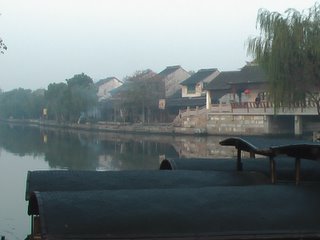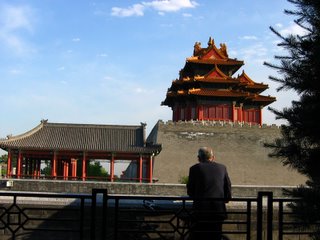
I felt sorry for Sandy, my boss’s wife, on our ride from Shanghai to the small Zhejiang town for shooting on location. Sandy, who’s riding with me and my boss’s personal assistant Peter, was told that the town we were heading towards had great scenery. Instead, all we found outside the car windows were highways, construction sites that turned the earth upside and down, drab concrete housings that dot the brownish farm land and a dirty haze hovering over them.
When our van passed by Jia Xing, a historic city famed for its soyed duck and scenery, we saw huge conference center and hotel/apartment complexes being built out of nowhere. Sandy finally broke the silence, “They are building some interesting buildings out here.”
I thought I heard reluctance in her voice but I wasn’t sure.
The first day she was in China, we took her and some crew members to the Xiangyang market, an outdoor market in Shanghai known for knockoff goods. She didn’t shop much.
The second day she wanted something more “cultural”. The hotel recommended Pudong, the new development area with many many skyscrapers, Xintiandi, a redeveloped bar area, Nanjing Road, a jam-packed heart-attack inducing shopping street, and the Yu Garden.
We took her to the Yu Garden, a very nice ancient garden, but less enticing because we had been there for scouting everyday and would shoot a chase scene around there later. Other than that, we seemed out of options for genuine “Chinese” culture in Shanghai.
So I was really looking forward to introducing her to the small town. Like all foreign tourists who come to China for the first time, She was looking forward to meeting the “real” China that’s the opposite of what Shanghai offers. In general I object to this type of stereotype-oriented tourism. But she was visibly disappointed.
Once we arrived on the set, however, the scenery did not disappoint. The area where we had set up camera equipments was an old town sitting on tiny river canals. The local government specifically preserved the area for tourism purposes. But instead of being a tacky tourist trap, it shined with genuine charm.
Maybe because the town is not yet famous in China, its way of life doesn’t seem having been perturbed much by tourists. Quaint two-storey houses with upturned eaves stared at each other across narrow cobble-stone streets along the river banks. The roof tiles were dark grey, the windows and doors of aged wood, and the walls shelling off paint that showed their history. Shop owners didn’t hustle for business in the streets, or jack up the prices to a foreign customer. Women sat on wooden bench in front of their shops knitting cotton sandals. Old grandmas stirred soy beans with spices and packed them in small plastic bags for sale. Locals drank tea in restaurants on the river. To cross to the other side of the canal, one had to walk along the bank to find one of the small stone bridges. It’s exactly the kind of beautiful southern town I had imagined.
“It’s really charming, isn’t it?” Sandy exclaimed while standing on a stone bridge. Both Peter and I heaved a sigh of relief.
Compared to Sandy, Peter’s positivism needed no pampering. At first I kept a distance from his overt friendliness, suspecting it being a professional handicap or cover from having been a personal assistant in Hollywood for too long – he smiled big, high-fived with everyone, and was always ready to get coffee for every crew member on the team.
My suspicion turned out only half true. The next day the sky cleared up magnificently for the first day of shoot. I spent most of my time with my boss and Peter on the set. While admiring the agility of the star jumping off the roof tops repeatedly, we chatted a lot.
“I don’t get these Americans.” He shook his head, “Did you heard that woman there? She refused to walk across the bridge because there were too many Chinese on it. What a jerk! And the river. What’s wrong with the river? The Americans are like whining babies. ‘Oh people must have dumped all kinds of chemical waste in it. Let’s stand as far back as possible.’ The water looks fine!”
After half a week in China, he sounded more defensive about the country than I am. I didn’t tell him then that China does pump a lot of chemicals in its rivers. Just a few days ago the city of Harbin had to shut down water supply for its 4 million residents after a chemical plant exploded upstream of the Songhua River nearby.
He slowly showed me more of the grumpy European side of his personality as the day went by. I’d been relatively quiet because I’d been tired from waking up at 5am every morning, which he perhaps took as being attentive and wise in an oriental way. He would greet a crew member with a bear hug and a “Hi bro, how are you doing?” a la Joey in Friends, and then a minute later would continue his complaining with me, “The people in Hollywood, they don’t care about filmmaking. They only care about paychecks, their stupid cars, and golfing.”
“You know, your country is on the verge of becoming something great.” He said to me, patting me on the shoulder as we walked out of the set to get a bottle of red wine for our boss. It’s only 4pm in the afternoon but the residents were already returning home. Our steps on the cobble stones left a moist echo down the narrow darkening street.
“Look at us, man, we in America are so jaded. We are getting things fed to us way too easily. All we cling to now are materialistic stuff. There’s no more real challenge or ideals.” He grunted and I nodded. He stopped to play with a kitten who timidly straddled over a wooden doorway. When we resumed walking he continued, “But look at your country – there are so many great changes happening. Everything is beautiful. Including this town.”
I was more cynical than he was but I nodded. It’s the weather Peter; I wanted to tell him. You are disillusioned by America but I don’t think China could substitute for this illusion. But I kept quiet. It’s cruel to tell the person who just complimented you on that nonsensical remark for its unintended witticism.
We stepped out of the old-town area and into present-day China. The town center consisted of a motorcycle mall and small store fronts selling low-end household goods. The buildings in this relative poor town were still boring square leftovers from the 70s. Bicycle bells competed with car horns. Dusk chased after each vehicle driving by.
See Peter, I wanted to tell him, this is what China is really like – dirty, chaotic and a bit sad.
“Hi hellow, how are you doing?” He greeted a mother holding a baby boy on the street. The mother turned away and giggled with her friends.
“I liked your country, man. Everything here is beautiful.” He sighed.
I was amused – how could he call it beautiful when all the history we had was a tiny area preserved for tourism only? Yet slowly, his optimism infected me. Perhaps I shouldn’t be so critical of my own country, I thought. Sometimes an outsider’s perspective may be more insightful.
Then I got this sms message on my mobile from a Taiwanese friend with whom I’d been playing phone tags with:
“Pathetic China. Even people at the airport don’t know how to wait in lines!”
I replied – “But you are Chinese as well.”
His answer – “I’m a Taiwanese in China. I’m fed up with the lack of culture here!”
Maybe we mainland Chinese are not jaded yet because we’ve destroyed so much of our own culture and yet not fully immersed in the Western commercialism. It’s this in-between state, looking forward to an unknown future, that provides hope and a sense of wonder, and beauty.
I know I know, it’s the weather – the sun was setting; a thin fog was moving over the town; and the people, still innocent from too much tourism, were greeting and smiling to each other. It’s a nice environment to be positive.





